Introduction: In this article, Jane Hampton Cook writes about a Jewish Thanksgiving prayer, written by Rabbi Isaac Touro in 1765 amid the turmoil over the Stamp Act. Jane is a presidential historian and author of “War of Lies: When George Washington Was the Target and Propaganda Was the Crime.” Her works can be found at Janecook.com. She is also the host of Red, White, Blue and You
Rabbi Isaac Touro (1738-1783) knew that Thanksgiving in 1765 was taking place in the context of much turmoil in Rhode Island and the other colonies in America. After all, King George III and Parliament had passed a new law on 22 March 1765, called the Stamp Act, which required the colonists to pay taxes by buying stamps for almost all paper documents. The king’s purpose behind this levy, which was the first internal tax imposed on the American colonies, was to pay for Britain’s debt incurred from the French and Indian War in America and the Seven Years’ War in Europe.
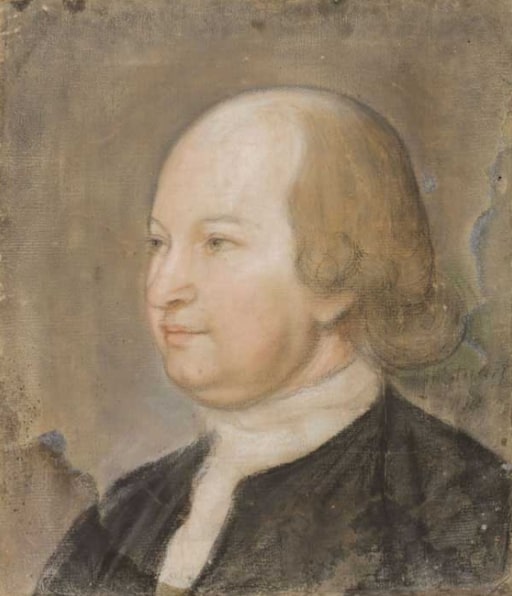
Concluding that the Stamp Act was unconstitutional, many colonists argued that Parliament could not tax them because America’s colonies were not represented by members of Parliament. In their view, the only powers that could tax them were their colonial legislative assemblies. The Stamp Act conflict led to protests and mob violence that targeted the stamp collectors hired by the governors. Many protestors hung straw effigies of their stamp collectors from poles or trees. Some of them paraded a coffin bearing the stamp collector’s name through town.
This article reported on a Stamp Act protest in New York city with a gallows and an effigy of the stamp collector.
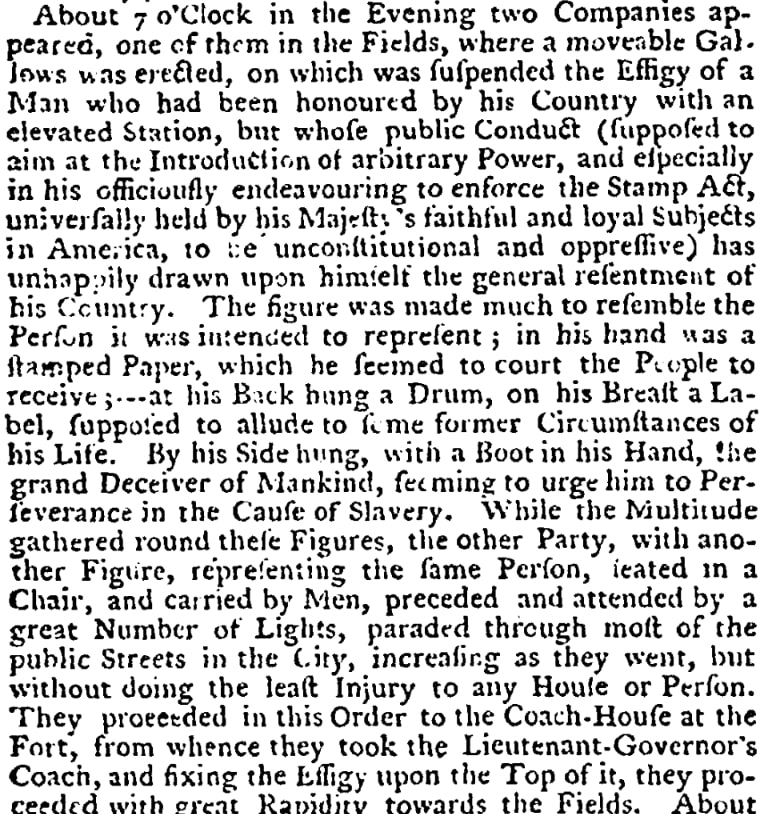
This article reported:
About 7 o’clock in the evening two companies appeared, one of them in the Fields, where a moveable gallows was erected, on which was suspended the effigy of a man who had been honored by his country with an elevated station, but whose public conduct (supposed to aim at the introduction of arbitrary power, and especially in his officiously endeavoring to enforce the Stamp Act, universally held by his Majesty’s faithful and loyal subjects in America, to be unconstitutional and oppressive) has unhappily drawn upon himself the general resentment of his country. The figure was made much to resemble the person it was intended to represent; in his hand was a stamped paper, which he seemed to court the people to receive; at his back hung a drum, on his breast a label, supposed to allude to some former circumstances of his life. By his side hung, with a boot in his hand, the grand Deceiver of Mankind, seeming to urge him to perseverance in the cause of slavery. While the multitude gathered round these figures, the other party, with another figure [effigy] representing the same person, seated in a chair, and carried by men, preceded and attended by a great number of lights, paraded through most of the public streets in the city, increasing as they went, but without doing the least injury to any house or person. They proceeded in this order to the coach-house at the fort [Fort George], from whence they took the lieutenant-governor’s coach, and fixing the effigy upon the top of it, they proceeded with great rapidity towards the Fields.
Living up to its well-deserved nickname – “Rogue Island” – Samuel Ward, Rhode Island’s governor, was the only colonial governor who didn’t attempt to implement the Stamp Act. Despite the turmoil caused by the Stamp Act, Governor Ward issued a proclamation calling for a day of Thanksgiving to be set aside on the last Thursday of November.
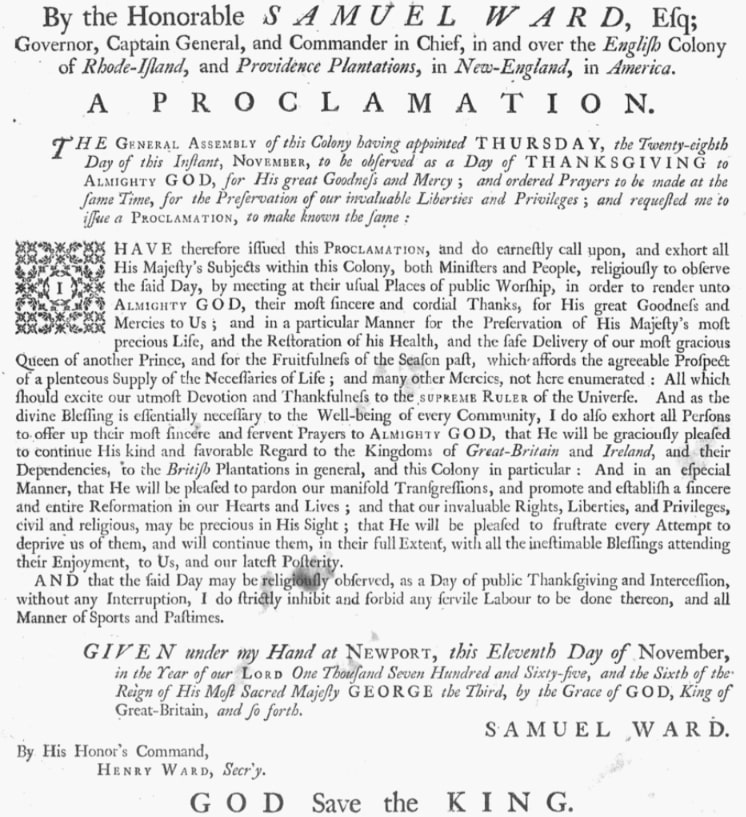
Realizing that he needed to underscore his loyalty to King George III after defying the Stamp Act, Governor Ward called for the “preservation of His Majesty’s most precious life, and the restoration of his health, and the safe delivery of our most gracious queen of another prince.” He also called upon ministers to meet “at their usual places of public worship, in order to render unto Almighty God, their most sincere and cordial thanks, for His great goodness and mercies to us.”
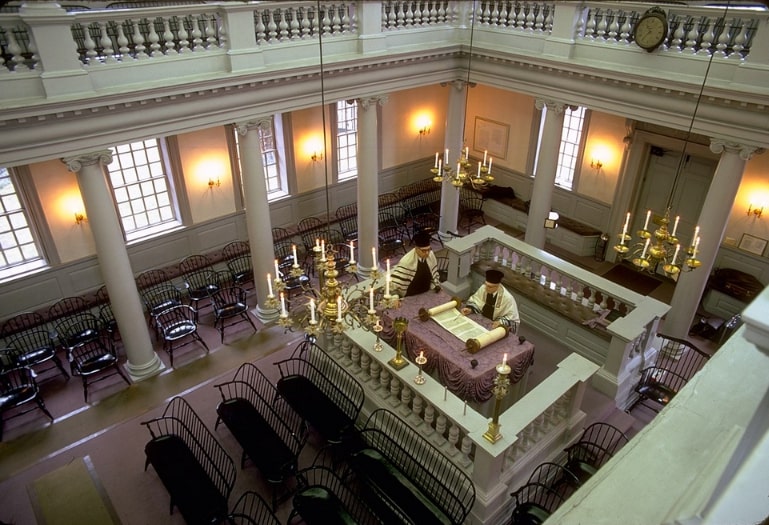
In Newport, Rhode Island, Isaac Touro read the governor’s proclamation. Touro was a religious leader who took his responsibility seriously. Two years earlier, he had led his congregation in dedicating the “new synagogue in this town.” The ceremony had included a “handsome procession, in which were carried the books of the law to be deposited in the ark” as well as prayers for the first family and solemn music. Newport’s newspaper had described the new synagogue as “the most perfect of the temple kind perhaps in America, and splendidly illuminated.”
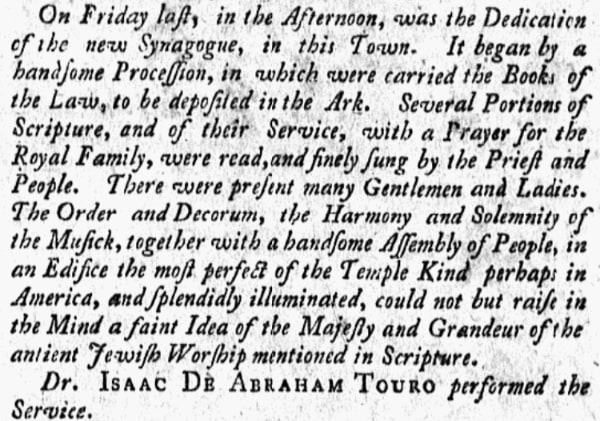
The edifice “could not but raise in the mind a faint idea of the majesty and grandeur of the ancient Jewish worship mentioned in scriptures.” As brilliant as his new synagogue was, Touro understood that many of the Jews under his care had come to America under duress. Many of them had fled persecution by the inquisition in Portugal and Spain. In Europe, Jews were frequently targeted and imprisoned for practicing their faith and traditions. Instead of building synagogues, Jews in Spain and Portugal had to pretend they were Catholic. Instead of anti-Semitic laws, America, especially Rhode Island and Pennsylvania, had offered Jews something they didn’t have in Europe: tolerance.
Answering Governor Ward’s call for Thanksgiving in 1765, Touro wrote a Thanksgiving prayer in Hebrew. He translated it into English and sent it to the editor of the Newport Mercury. He led his synagogue in the prayer of Thanksgiving to God in spite of the turmoil caused by the Stamp Act.
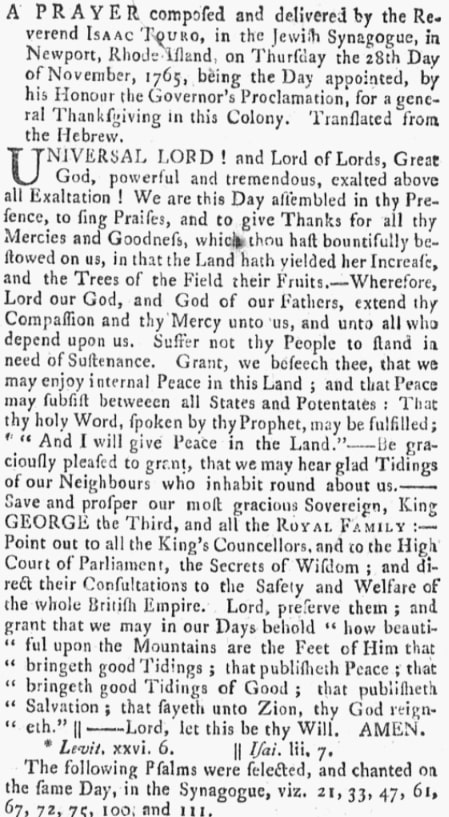
Touro’s prayer, printed in full below, is the first Jewish Thanksgiving prayer published in a newspaper.
“Universal Lord! And Lord of Lords, Great God, powerful and tremendous, exalted above all Exaltation! We are this day assembled in thy presence, to sing praises, and to give thanks for all thy mercies and goodness, which thou hast bountifully bestowed on us, in that the land hath yielded her increase, and the trees of the field their fruits.
“Wherefore, Lord our God, and God of our Fathers, extend thy compassion and thy mercy unto us, and unto all who depend upon us. Suffer not thy people to stand in need of sustenance. Grant, we beseech thee, that we may enjoy internal peace in this land; and that peace may subsist between all states and potentates; that thy holy word, spoken by the prophet, may be fulfilled: ‘And I will give peace in the land.’
“Be graciously pleased to grant that we may hear glad tidings of our neighbors who inhabit round about us.
“Save and prosper our most gracious sovereign, King George the Third, and all the Royal family.
“Point out to all the king’s counselors, and to the high court of Parliament, the secrets of wisdom; and direct their consultations to the safety and welfare of the whole British Empire. Lord, preserve them; and grant that we may in our days behold ‘how beautiful upon the mountains are the feet of him that bringeth good tidings; that publisheth peace; that bringeth good tidings of good; that publisheth salvation: that sayeth unto Zion, thy God reigneth.’
“Lord, let this be thy will. Amen.”
Explore over 330 years of newspapers and historical records in GenealogyBank. Discover your family story! Start a 7-Day Free Trial
Note on the header image: Touro Synagogue, Newport, Rhode Island, built in 1763 – the oldest surviving synagogue in the U.S. Credit: Kenneth C. Zirkel; Wikimedia Commons.
